 Headline News
Headline News
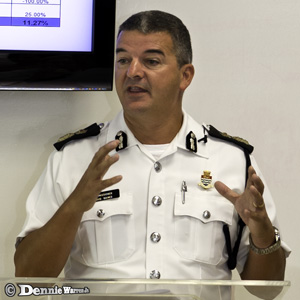
Cops target 2nd hand shops
 (CNS): The country’s top police officer has said that there needs to be a new law passed as quickly as possible to regulate the purchase of second hand jewellery by dealers in order to stop thieves from fencing their ill-gotten gains through these stores. Police Commissioner David Baines said recently that stolen goods are finding their way into these stores, so there is a need to compel businesses to log the details of the people they buy from and to prevent the dealers from melting down jewellery for at least seven days. (Photo Dennie Warren Jr)
(CNS): The country’s top police officer has said that there needs to be a new law passed as quickly as possible to regulate the purchase of second hand jewellery by dealers in order to stop thieves from fencing their ill-gotten gains through these stores. Police Commissioner David Baines said recently that stolen goods are finding their way into these stores, so there is a need to compel businesses to log the details of the people they buy from and to prevent the dealers from melting down jewellery for at least seven days. (Photo Dennie Warren Jr)
The theft of jewellery was not a common occurrence in the past in Cayman but now that several “cash for gold/jewellery” stores and other second had traders have emerged burglars are using these establishments to offload the stolen items, which are either sold on or melted down.
Baines explained that while local burglars once focused on cash and electrical goods the police are seeing a lot more jewellery being stolen now as well.
“One trend that has become apparent is that there’s been a shift in the types of property burglars are looking for. Electronic items and cash are still being taken, but now, more than ever, we’re seeing burglars take jewellery. We have over the past few months recovered some stolen items from businesses which specialise in buying and selling second hand electrical equipment and jewellery,” the commissioner said recently.
He said that, as a result of this latest criminal development, the RCIPS is now in discussion with the Legal Department with a view to “placing additional responsibility on second-hand dealers and pawn shops to produce comprehensive records to the police on demand.”
Baines also said he wanted to prevent the disposal of melting of breaking down of property for at least seven days after the dealers have purchases goods. “These proposals would protect the consumer and the outlets, as well as making it much more difficult for people to make a quick buck from stolen property,” Baines stated.
Speaking to members of the Chamber of Commerce during the recent ‘Be Informed’ series, Baines said it was important that these businesses assist the police with appropriate record keeping about who sold them the goods and the registration plate of the car they came in.
“We don’t want to deny people the lawful right to trade in second hand goods but we need businesses to act legitimately,” he added. The commissioner said that if the stores were to keep proper records then they could demonstrate that they were trading lawfully and they would then be free to sell on or melt down the property they had bought.
However, he said where dealers were consistently found with stolen goods and suspected to be trading in stolen goods the police would act. “We have already recovered stolen goods from second hand stores and … I am now going to write to the shops,” he said.
The commissioner said it was about people acting reasonably but once legislation was in place it would be easier to see where business were not being responsible. Baines noted that with the changing dynamics of criminality the police had to be able to move quickly to address trends and it this case it would require legislative support. While the registering and logging of second hand goods sales was new to Cayman, it was widely used in other jurisdictions.
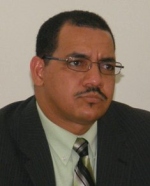
Anglin promises stability
 (CNS): The education minister has said there is a need to stabilize the country’s education system as a result of strategy overload and confusion among teachers. Rolston Anglin said that while his predecessor had instigated lots of conversation when he was in office he said there was very little consultation with teachers. The minister said that his new stabilisation plan for education differs from the national consensus on education drawn up by the previous minister because it will involve input from teachers. Anglin also said that some individuals put in place by the previous minister had “wreaked havoc on the system” as they were the wrong people in the wrong posts leading to structural “dysfunction.”
(CNS): The education minister has said there is a need to stabilize the country’s education system as a result of strategy overload and confusion among teachers. Rolston Anglin said that while his predecessor had instigated lots of conversation when he was in office he said there was very little consultation with teachers. The minister said that his new stabilisation plan for education differs from the national consensus on education drawn up by the previous minister because it will involve input from teachers. Anglin also said that some individuals put in place by the previous minister had “wreaked havoc on the system” as they were the wrong people in the wrong posts leading to structural “dysfunction.”
The minister told CNS that he believed that his plan was focused on the bigger picture and that it would give teachers the opportunity to have direct input on what was happening and give them a clear direction on where education was going. The creation of a consultative council, he said, would enable the profession to communicate directly with him and for educators to have real input on policies before they were implemented.
The current education minister stated that when he came to office teachers’ morale was at an all time low because they were being bombarded by change when there had been no proper planning or training for that change and they did not feel as though they had been consulted.
He said that the previous minister had raised the expectations among teachers with the national conference and a lot of conversation but they had been let down by the reality, which did not involve them. “After the 2005 conference the profession was on a high as they felt something big was going to happen,” Anglin stated. “But in the end that were let down as dictat after dictat was thrown at them. There may have been lots of conversation but there was no real consultation.”
Teachers, Anglin said, were being constantly told to implement new strategies that they were not trained for and that there had been inadequate professional, development and training to help teachers implement the changes. Change was being forced upon teachers, he said, without any plans for that change being made.
He also accused the minister of running a dysfunctional team, when he said a small number of individuals “wreaked havoc with the system”. The minister would not say who they were but stated some were civil servants who were still in the ministry but had been moved to posts that better suited their skills, as well as some consultants. Anglin said that he had put the right people in the right place within the education department.
Anglin denied that the latest plan was simply change for change’s sake or an attempt to undermine the previous minister in order to make his own mark on the country’s education system, but he said it was being implemented because he believed there was a need to stabilise a system that in large measure had crashed. He said the plan would document the priorities identified by the educators for improving the system.
"This plan documents the choices we made since 2009 after consultation with teachers, students, parents and other education stakeholders," he said. "It responds to the many pressing needs and challenges, and aims to create a stable foundation for further work".
The plan, he said, would set the strategic direction for the system making it clear "where we are, where we are going and why", as he said that was lacking in the previous efforts at reform.
Despite stating that teachers were suffering from strategic overload, he said the plan was the forerunner of a National Strategic Plan, which in turn will build on the Stabilisation Plan, taking a longer-term perspective.
The Education Stabilisation Plan is organised under four broad priority areas, the minister explained: "Enhancing Leadership and Governance", "Enhancing Student Performance", "Enhancing Skills for Work Readiness", and "Improving and Expanding Early Childhood Care and Education".
Every educator in the government system has now received copies of the plan, which is in draft format, to allow for feedback. Also distributed were copies of an Education Progress Report, which he said documents the progress that has been made since 2009 against the priorities identified in the Plan.
“Our challenge is to build, implement and support an education system that creates citizens who can contribute to the economic and social growth of the Cayman Islands,” Anglin stated. “We are not going to see the benefits of these new programmes tomorrow, but we’re about to embark on something that will be meaningful and exciting and that will have a profound impact.”
He said he wanted a world class education system for Cayman and that would be measured by the eventual world class outcomes.
To see the Education Stabilisation Plan and Education Progress Report go to www.education.gov.ky
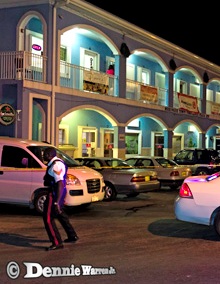
Trapped robbers shoot way out of store
 (CNS): Updated – Three, masked armed gun men shot their way out of a money transfer office on Thursday evening after onlookers tried to foil an armed robbery, police have confirmed . At around 7:30pm on Thursday, 3 February, robbers targeted the Moneygram office at the Meringue Town minimart on Boilers Road in George Town. The robbers reportedly entered the premises (which has been targeted by robbers in the past) with at least one firearm and demanded cash from staff. In the process of the robbery people outside the store reportedly locked the hurricane shutters in an effort to contain the suspects. However, the robbers then shot out the doors in order to make their escape. A police spokesperson said no one was injured but it is not known if the suspects got any cash. (Photos by Dennie Warren Jr)
(CNS): Updated – Three, masked armed gun men shot their way out of a money transfer office on Thursday evening after onlookers tried to foil an armed robbery, police have confirmed . At around 7:30pm on Thursday, 3 February, robbers targeted the Moneygram office at the Meringue Town minimart on Boilers Road in George Town. The robbers reportedly entered the premises (which has been targeted by robbers in the past) with at least one firearm and demanded cash from staff. In the process of the robbery people outside the store reportedly locked the hurricane shutters in an effort to contain the suspects. However, the robbers then shot out the doors in order to make their escape. A police spokesperson said no one was injured but it is not known if the suspects got any cash. (Photos by Dennie Warren Jr)
Police immediately set up road blocks in the wake of the incident which is the seventh armed robbery of 2011 less than five weeks into the year.
All three men were wearing dark clothing and masks and anyone who was in the area at the time of the incident who has information which could assist the investigation should call George Town CID on 949-4222 or the confidential Crime Stoppers number 800-8477 (TIPS).

CCTV will spot witnesses
 (CNS): It won’t just be the criminals that will be under the watchful eye of the country’s CCTV system when it is rolled out over the coming weeks but the witnesses to that crime as well. With 140 cameras due to be installed in crime hot spots and vulnerable areas shortly, the police have said that the electronic surveillance equipment will be used not just to record the criminal acts but the people who were there to see it. The police commissioner said that, while criminals cover their faces, those present at the scenes of crime don’t, and instead of law enforcement having to wait for people to step forward, if officers can identify witnesses, they will be able to seek them out to persuade them to assist.
(CNS): It won’t just be the criminals that will be under the watchful eye of the country’s CCTV system when it is rolled out over the coming weeks but the witnesses to that crime as well. With 140 cameras due to be installed in crime hot spots and vulnerable areas shortly, the police have said that the electronic surveillance equipment will be used not just to record the criminal acts but the people who were there to see it. The police commissioner said that, while criminals cover their faces, those present at the scenes of crime don’t, and instead of law enforcement having to wait for people to step forward, if officers can identify witnesses, they will be able to seek them out to persuade them to assist.
Police Commissioner David Baines has said that he believes the first tranche of cameras to be installed in the $2 million project will begin to make a positive impact on the level of crime quickly and be a great help to officers during investigations. As well as providing an invaluable recording of crime taking place, the cameras will also record witnesses to crimes, which he says will be of great assistance to investigators, especially when criminals wear masks or have their heads covered.
Given the difficulties the police have had getting witnesses to come forward, Baines said he believes the CCTV will help officers trace witnesses who may have a better idea who the criminals are from being at the scene. “It will stop people who have witnessed a crime from being able to step into the background,” Baines stated, as he explained that at the moment the police are at the mercy of the people admitting they were there and voluntarily coming forward.
“People now have a personal choice as to whether they step forward and say what happened,” he said. “CCTV identifies the witnesses as well as the offenders and victims. They will allow us to identify people who potentially saw something and be proactive in seeking those witnesses out instead of waiting for them to come forward.”
He said the public has an obligation to assist the police in their investigation, and while they can’t force people to talk if they know who saw the crime, it gives the police an opportunity to persuade them to assist with the enquiry and if necessary offer witness protection.
The police commissioner revealed at the recent Chamber of Commerce ‘Be informed’ series meeting with the business community last week as well as a press briefing revealing the current crime statistics that the cameras were expected to be in place within the next six weeks and the priority locations were being identified.
He explained that some cameras will be placed on the streets in hot spot areas, others overlooking vulnerable properties such as banks, and those cameras designed to capture number plates will also be strategically placed at road junctions to view vehicles that could have been used in crime. Aside from picking up stolen vehicles and getaway cars, these cameras would also allow the police to track suspects and known offenders. The cameras store number plates so the police will be able to plot where people have been. “That’s important, not just to show where people were, it will also show where they were not,” Baines added, explaining that would be a useful tool to help confirm people are where they say they are during enquiries.
The cameras can be set up, he explained, to trigger an alarm when a certain number plate passes through but that would be used mostly for stolen vehicles. He offered some reassurance to the wider driving public when he said the alarm would not be set to trigger when cars with out of date coupons or insurance pass them.
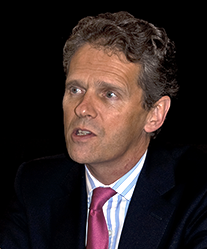
Anti-crime plan with Cabinet
 (CNS): The work of the country’s National Security Council over the last twelve months is about to be reviewed by Cabinet and will be made public soon, the governor promised on Wednesday. Duncan Taylor said that while there was no easy way to turn the clock back on crime, the council had come up with, and agreed, a national strategy on crime prevention. Admitting that it had taken the new council, formed under the 2009 Constitution, some time to get going, he said that the strategy represented a considerable amount of work. He also said that his office was examining how, given the nature of the NEC, more information about what it was doing could be revealed to the public.
(CNS): The work of the country’s National Security Council over the last twelve months is about to be reviewed by Cabinet and will be made public soon, the governor promised on Wednesday. Duncan Taylor said that while there was no easy way to turn the clock back on crime, the council had come up with, and agreed, a national strategy on crime prevention. Admitting that it had taken the new council, formed under the 2009 Constitution, some time to get going, he said that the strategy represented a considerable amount of work. He also said that his office was examining how, given the nature of the NEC, more information about what it was doing could be revealed to the public.
Speaking at a press briefing marking the end of his first year in office, Governor Duncan Taylor revealed that the council had agreed the crime reduction strategy and said that although it was still early days for the council, it was beginning to play a useful role.
He said that the strategy had been arrived at after collaboration among all the ministries and looking at all the different programmes that existed in the Cayman Islands that contributed to a reduction in crime. He also said the council had examined previous reports, such as the comprehensive report on the pre-disposing factors to criminality by Yolande Forde published in 2005 (attached below), among others.
He said the crime reduction strategy was a comprehensive and substantive piece of work but he was aware that people were wondering what the council had been doing over the last twelve months. Not least because of the need to keep the details of the discussions confidential, information was not getting out about the council’s work. However, consideration was being given to getting more information about the work of the NEC out to the public, the governor revealed.
“I recognise that we need to find a way of giving more information about what it is we are discussing and where we are going, and what we are going to do next after the crime prevention strategy,” he said. “What’s the mechanism for taking that from being a piece of advice from the NEC to government actually taking it forward.”
He said that tackling crime was still an ongoing issue and that he had confidence in the work of the RCIPS and the commissioner. He pointed to a programme targeting youth in primary schools that had been identified as being at risk and making intervention with those children and their families.
The governor cited the imminent introduction of CCTV as another positive move towards addressing the rising crime in the community. While not a cure all, it was another element to help. He said the police were still going through a rebuilding process to fill key vacancies
He also pointed to the many legislative changes that have been enacted to make bringing prosecutions easier and said their impact on crime would be revealed over the coming months. “The next few months will be interesting as they reveal how those bills will work in practice,” he said, adding that there were many things going on that were designed to address crime.
However, the governor warned that with the recession still biting, people were still out of work and there was plenty of evidence that in a global downturn people turn to crime and that it was also important to get the economy going again to help address the problem of crime.
He pointed out that while there were still problems, the unprecedented situation when he arrived with some five shootings over a period of around 8 weeks had been addressed and the police had made serious headway in solving those cases.
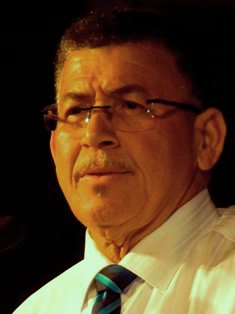
Cohen loan deal cancelled
 (CNS): The controversial deal that government had entered into with the New York based finance firm Cohen & Company Capital Markets LLC to borrow US$185 million has been terminated. The country’s premier told the nation in a live broadcast Wednesday evening that the 4.5% interest rate cap which the firm said it could get had not materialised and government had cancelled the arrangement. McKeeva Bush also revealed that government may reconsider its borrowing requirement in light of new positive figures for the first half of this financial year, which reveal an unaudited public surplus of $17m instead of an expected $14m deficit.
(CNS): The controversial deal that government had entered into with the New York based finance firm Cohen & Company Capital Markets LLC to borrow US$185 million has been terminated. The country’s premier told the nation in a live broadcast Wednesday evening that the 4.5% interest rate cap which the firm said it could get had not materialised and government had cancelled the arrangement. McKeeva Bush also revealed that government may reconsider its borrowing requirement in light of new positive figures for the first half of this financial year, which reveal an unaudited public surplus of $17m instead of an expected $14m deficit.
“The encouraging performance in the first six months of the year will cause the government to assess whether it needs to utilise its full borrowing empowerment,” Bush told the people in the official statement. “The assessment arises from the government’s philosophy of minimising borrowing in order to act in the best interest of the country, at all times.”
Bush delivered the news about the country’s improving finances after explaining that the controversial deal with Cohen and Co had collapsed. He said government had been advised that the savings of approximately US$24 million on the bid recommended to government via the Central Tenders Committee would not be realized.
“Key amongst the representations made to government was that a 4.5% Interest Rate Cap could be obtained, at a certain price, so that the rate of interest that government would pay on its current year borrowing would never exceed 4.5%,” Bush said as he explained why he had originally opted for the Cohen deal last October instead of accepting the recommendations of the ministry’s technical team, which was endorsed by the CTC.
“Government has now been advised that the 4.5% Interest Rate Cap cannot be obtained at the price previously represented to government. The increase in the price of the Interest Rate Cap is of such magnitude that it would wipe-out the cost-minimisation advantage that had been agreed.”
He said government has always acted in the country’s best interests so it had cancelled the deal. Now with the news that government finances are improving the amount government needed to borrow needed to be reviewed, but he warned that the solid performance may not necessarily continue at the same rate in the next six months.
The improvement in the state of the government’s coffers, Bush said, was not an accident. "The expenditure results being lower than budget expectations are a direct result of a conscious effort being taken across the government and supported by the wider public sector to restrain expenditures without jeopardising the quantity or quality ofservices offered to the public,” the premier noted, as he congratulated the public service for its efforts.
The premier stated that total operating revenues were $267 million, around $12 million better than budget expectations of $255 million for the half-year. He revealed that operating expenses were down to $236 million $17 million less than budget expectations. Financing expenses for the half-year were also around $2 million dollars less than expected and central government was looking at an unaudited surplus for the half-year of $17m, which was significantly better than the expected deficit for the half-year of $14 million.
With statutory authorities and government companies showing a surplus of around $1 million instead of an anticipated deficit of $800,000, the entire public sector surplus for the half-year to 31 December 2010 was a promising $18 million, instead of an overall $15 million.
UK official to review PMFL
(CNS): The law which governs the country’s public finances is to be reviewed by an official from the Foreign and Commonwealth Office (FCO), the governor has revealed. Keith Luck, who is expected to arrive in the Cayman Islands shortly, will be examining the Public Management and Finance Law and the systems that underpin government personnel and financial management. At a press briefing on Tuesday morning Duncan Taylor said it was clear that the financial system was not operating properly and Luck would be seeking ways to improve the situation. The governor denied that it was a skills issue that was causing the country’s financial management problems but felt it was the cumbersome nature of the PMFL.
A release from the Premier’s Office in the wake of the briefing said that Luck had recently completed a four-year contract as director general, finance in the FCO and would be employed by the CIG as a consultant while he carried out the review. “The Foreign and Commonwealth Office contracted him to reform their financial and corporate systems,” the premier’s office stated, adding that he is a fellow of the Chartered Institute of Management Accountants.
Luck’s review will focus on the mechanisms that underpin the financial and human resources management model as well as the law itself and the regulations. The UK official will also examine the Integrated Resource Information System (IRIS), which is the Oracle based system that runs all of government’s financial and human resource transactions. During his time here Luck is expected to meet with government officials and private sector organisations and he will report to Cabinet on an ongoing basis.
Governor Duncan Taylor, who was reviewing his first year in office, also stated that, along with the auditor general, Luck would be examining the procurement process, which has also come in for criticisms recently, in relation to issues of good governance. The process has been by criticised by the premier who says it is bureaucratic and presents stumbling blocks to his government’s plans to kick start the economy, while the wider public have raised questions about the vulnerability of the system and a lack of real transparency.
The governor said that a review by the AG had found nothing untoward regarding the CCTV tendering process and that the government would soon be making an announcement about the loan.
Taylor said he did not believe the shortage of skills, which has been cited by government officials as one of the reason why it cannot produceits accounts as required under the law, was not the problem as “we have some good accountants” in the public sector, he said, but it was the cumbersome nature of the system that was to blame.
He said he believed that once the excessive burden of the workload was reduced it would be revealed that there were sufficient skills, but if not then those skill gaps could be addressed once the system was simplified.
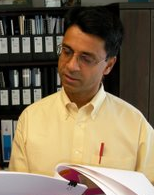
Schools not an ‘experiment’
 (CNS): Award winning school designer Prakash Nair (left) flew into Cayman yesterday in order to answer the criticisms and disparaging remarks made about the new Cayman Islands high schools that he and the late Jeffery Lackney designed. Nair said the current minister only seems to understand the concepts of 1950s instruction, which will not prepare the next generation of school leavers for the competitive world of work they will face. Denying that there was anything experimental about the schools he created for Cayman, he said the concepts are already being used around the world in awarding winning, exceptionally successful schools. “It is not an experiment when a concept has already been proven to succeed,” he said.
(CNS): Award winning school designer Prakash Nair (left) flew into Cayman yesterday in order to answer the criticisms and disparaging remarks made about the new Cayman Islands high schools that he and the late Jeffery Lackney designed. Nair said the current minister only seems to understand the concepts of 1950s instruction, which will not prepare the next generation of school leavers for the competitive world of work they will face. Denying that there was anything experimental about the schools he created for Cayman, he said the concepts are already being used around the world in awarding winning, exceptionally successful schools. “It is not an experiment when a concept has already been proven to succeed,” he said.
Nair spoke to CNS about the disparaging comments Rolston Anglin, the current education minister, had made on public radio in Cayman and in the country’s Legislative Assembly about both the schools and the designers and pointed out that it is the children who will be let down by a return to past failures.
Having designed hundreds of schools on five continents, in 32 different countries, in deprived and difficult areas, as well as in communities where parents have high expectations, Nair says he has not come to Cayman to defend his reputation. That is perfectly intact, he added, not least because of the string of success andawards he and his partners have enjoyed for their work creating and redesigning schools, but he says he is in Cayman to try and save the learning communities he designed in the best interests of the children of the Cayman Islands.
Admitting he is a futurist, Nair asked: “But who else would you want to design schools? Someone rooted in the past? Children are in the future. They are the future. We cannot anticipate what their world will be but we know already that they will face the most competitive work environment. Children from the Cayman Islands will be competing on the world stage for work with people from China and India, whose populations are so vast those governments can afford to lose thousands of people from the education system. Cayman cannot afford to lose one student.”
Having designed what has been awarded the world’s best school by the oldest educational body in the world, Nair has also redesigned schools in intercity areas, such as Detroit and New York, where students were failing in huge numbers and turned them around to create places where children are thrilled to learn and with pass rates exceeding all expectations. He says no two schools that he has created are identical but they are all designed to inspire learning.
The architect said he believed the current minster simply does not understand the design and how the spaces create more positive learning environments but misunderstands the concept. He said the minister has also misled the Cayman public as the schools are designed with many classrooms and closed areas for quiet learning. He said there would never be a scenario where four different teachers are taking four different classes in the same space.
Nair said none of his partners are doing anything to justify their expensive consultants’ fee, a charge the minister made against him, and he pointed out that had he only been interested in the fee he would have opted for a “cells and bells” (the traditional instruction classroom) approach as that is still what many people want schools to be and seems to cause less waves.
“We don’t design those kinds of schools where children are treated like cattle; we design spaces where all children are encouraged, motivated and inspired to learn,” he said. “We designed schools here where Caymanian children could grow and succeed instead of continuing to fail by repeating the mistakes of the past.”
Anglin’s dismissal of the design of the schools comes as no surprise to Nair, who says the current minister is, like many other people, stuck in the past image of what a school should be and is afraid to embrace the change.
Nair noted, however, how odd it is that in every other aspect of our lives we recognize that the environments need to be modern. He said people seem to expect teachers to do their work in dated environments, despite the phenomenal changes already taking place in education. He said that while people would never expect the pilot of a modern aircraft to land that plane on a runway designed for a small plane for a bygone era, we expect our teachers to educate our children in spaces designed in the 1950s.
“There are 20 different ways that we learn,” Nair said. “Standing at the front of the class and lecturing is only one of them. Our schools are designed to allow teachers to utilize the other 19 ways and whatever it takes to inspire students to learn these learning communities can facilitate that.”
Nair noted that it often takes teachers time to understand the spaces and how they can utilize them but once they have taken on the infinite possibilities they present, he said, no one ever wants to return to the cells of the past. However, the designer has warned that Cayman is heading into the past if it undermines the design principles that underpin the new high schools and return to a system that has been demonstrated to fail instead of embracing the future, which hesays has been proven to work.
Commending the previous minister for having not just a vision of a better future for Caymanian students but for being willing to take the risks to turn around the past failures, Nair said he truly hoped that the real purpose of the new schools to inspire children to learn can be saved.
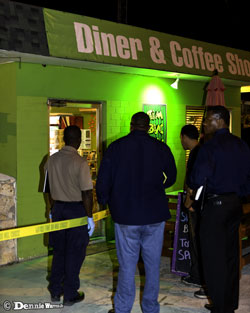
WB restaurant robbed again
 (CNS): A small restaurant and coffee shop in West Bay was targeted by robbers on Tuesday night a mere two weeks after an earlier robbery at the same place. Police said that just before 9:30pm last night (1 February) two masked men entered Tim Buc Tuu restaurant on Town Hall Road, West Bay armed with what appeared to be a handgun. The robbers threatened restaurant staff before fleeing the scene via the rear door with a sum of cash. The suspects are described as being around 5ft 10 inches in height and wearing dark clothing. They both had their faces covered. No shots were fired and no-one was injured in the incident. The restaurant was also victim to two robbers on 15 January when robbers also threatened staff and made off with takings and tips. (Photos Dennie Warren Jr)
(CNS): A small restaurant and coffee shop in West Bay was targeted by robbers on Tuesday night a mere two weeks after an earlier robbery at the same place. Police said that just before 9:30pm last night (1 February) two masked men entered Tim Buc Tuu restaurant on Town Hall Road, West Bay armed with what appeared to be a handgun. The robbers threatened restaurant staff before fleeing the scene via the rear door with a sum of cash. The suspects are described as being around 5ft 10 inches in height and wearing dark clothing. They both had their faces covered. No shots were fired and no-one was injured in the incident. The restaurant was also victim to two robbers on 15 January when robbers also threatened staff and made off with takings and tips. (Photos Dennie Warren Jr)
This is the sixth armed robbery of 2011, less than five weeks into the year, and comes in the wake of police crime statistics that revealed some 64 robberies were committed during 2011.
Anyone who was in the area at the relevant time and witnessed the robbery or the men running off from the scene should contact West Bay police station on 949 – 3999 or the confidential Crime Stoppers number 800-8477 (TIPS).
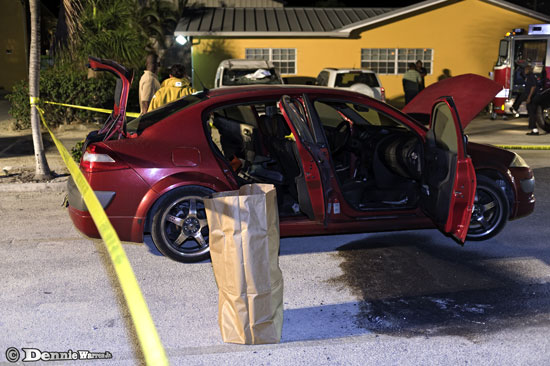 Meanwhile, fire examiners are investigating the circumstances surrounding a fire in a car which occurred around 8pm yesterday night while it was parked in the Compass Centre car park. The car’s engine is believed to have been on fire and firemen removed the gas tank after putting out the smouldering fire in the vehicle.
Meanwhile, fire examiners are investigating the circumstances surrounding a fire in a car which occurred around 8pm yesterday night while it was parked in the Compass Centre car park. The car’s engine is believed to have been on fire and firemen removed the gas tank after putting out the smouldering fire in the vehicle.
Gun seized at 7MB club
(CNS): Police have confirmed that two men have been arrested and a firearm recovered in connection with an incident at a luxury Seven Mile Beach condo complex today. A spokes person for the RCIPS said that at around 10.50 am this morning (Tuesday 1 February) officers responded to a report of a disturbance at the Caribbean Club on the West Bay Road. A spokesperson said, “We can confirm that two men aged 24 and 25 years have been arrested in connection with the incident and that a firearm was recovered at the location.” No other details have been given but witnesses say the club was taped off and a number of armed officers were seen in the area, which is in the heart of the tourist district.
Police said that enquiries in connection with the incident are ongoing.